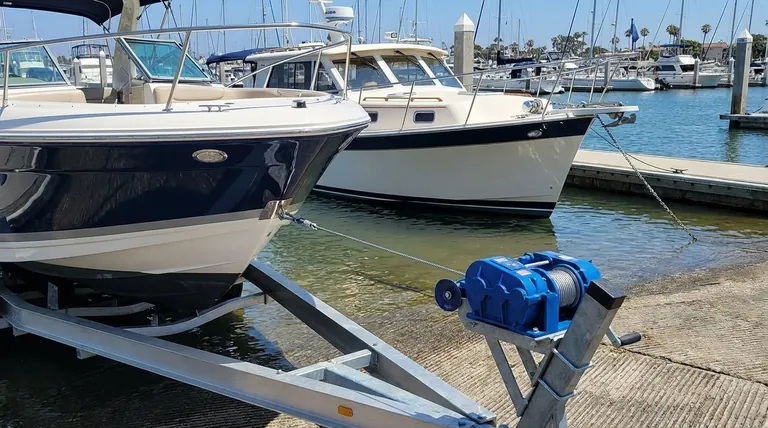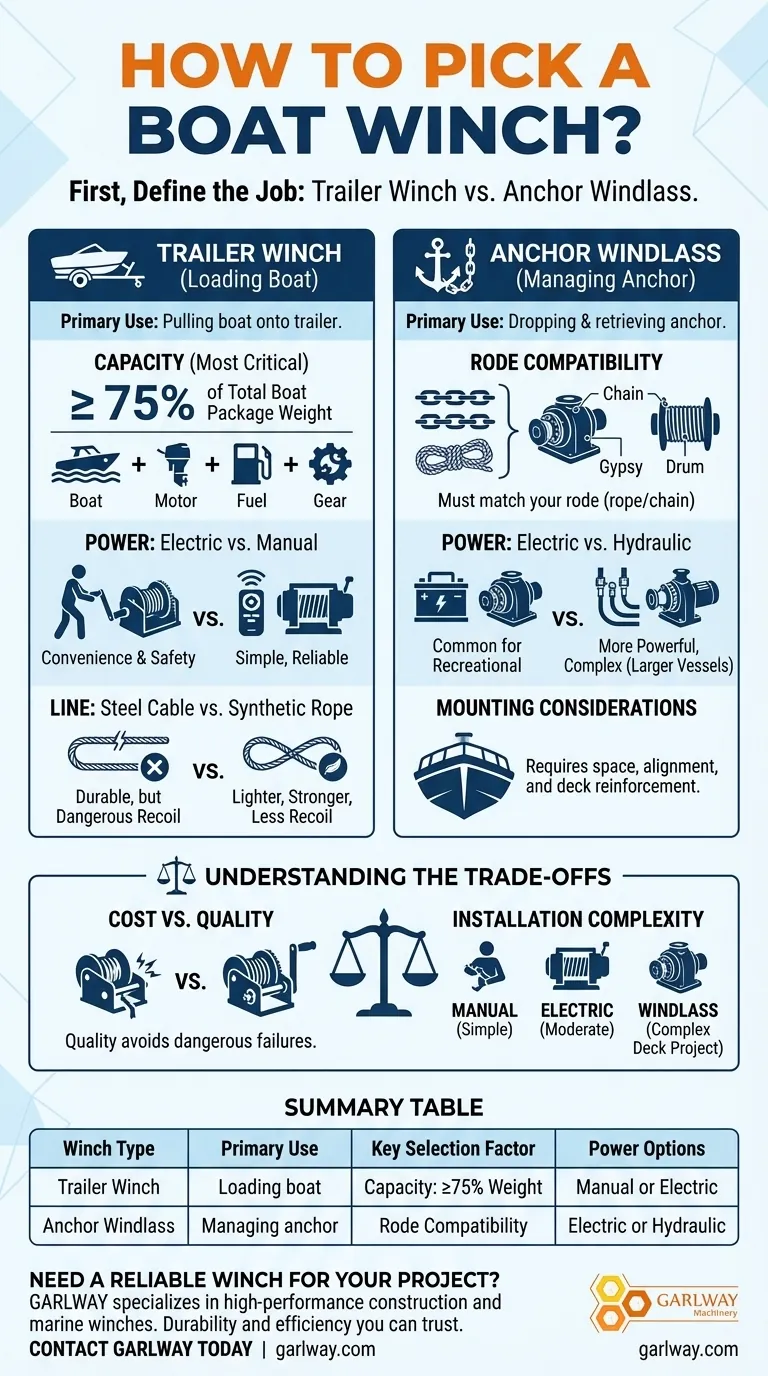To choose the right boat winch, you must first determine its primary job: loading your boat onto a trailer or managing your anchor. For a trailer winch, the most critical factor is capacity; select one rated for at least 3/4 of the total weight of your boat, motor, fuel, and gear. For an anchor winch, also known as a windlass, the primary factors are compatibility with your anchor rode (rope or chain) and the available space for installation.
The term "boat winch" is often used for two very different tools: one for pulling your boat onto a trailer and another for pulling your anchor from the seabed. The correct choice depends entirely on which of these two distinct tasks you need to accomplish.

First, Define the Job: Trailer Winch vs. Anchor Windlass
Before looking at features, you must identify the winch's purpose. The design, power, and capacity requirements for loading a boat and weighing anchor are fundamentally different.
For Loading Your Boat (Trailer Winch)
A trailer winch is mounted on the winch post of your boat trailer. Its sole function is to pull the boat out of the water and securely onto the trailer bunks or rollers. This is the most common type of "boat winch."
For Managing Your Anchor (Anchor Windlass)
An anchor windlass is mounted on the deck of the boat, typically at the bow. It is a more complex system designed to drop and retrieve your anchor and rode (the line or chain connecting it to the boat), saving significant manual effort.
Key Factors for a Trailer Winch
Once you've confirmed you need a winch for your trailer, you can narrow down the options based on these critical criteria.
Calculating the Correct Capacity
This is the single most important factor for safety and performance. The general rule is to choose a winch with a capacity rating of at least 75% of the total weight of your boat package.
To calculate this, sum the weight of your boat, motor, fuel, and all onboard gear. A heavier or longer boat will naturally require a more powerful winch.
Choosing Power: Electric vs. Manual
Electric winches provide significant convenience and safety, especially for larger boats. They connect to a power source and do the heavy pulling for you, often with a remote control.
Manual (or hand-crank) winches are simpler, less expensive, and require no power source. They are a reliable choice for smaller, lighter boats where the physical effort is manageable.
Choosing a Line: Steel Cable vs. Synthetic Rope
Steel cable is the traditional choice, known for its durability and abrasion resistance. However, if it snaps under load, it can recoil with dangerous force.
Synthetic rope is a modern alternative that is lighter, stronger than steel of the same diameter, and easier to handle. Crucially, it does not store as much kinetic energy and is less likely to snap back dangerously if it breaks.
Key Factors for an Anchor Windlass
If your goal is to automate anchoring, your considerations shift from raw pulling power to system integration and compatibility with your existing equipment.
Matching the Windlass to Your Rode
A windlass has a specialized wheel called a gypsy (for chain) or a drum (for rope). You must select a windlass specifically designed for the type and size of rode you use. Many modern windlasses can handle both rope and chain combinations.
Power Source: Electric vs. Hydraulic
Electric windlasses are most common on recreational boats. They are easier to install and are powered by your boat's electrical system.
Hydraulic windlasses are more powerful and are typically found on larger vessels. Their installation is significantly more complex and requires a dedicated hydraulic system.
Critical Mounting Considerations
Unlike a trailer winch, a windlass requires careful installation on your deck. You must ensure there is adequate space, proper alignment with the bow roller for a smooth pull, and potentially reinforce the deck to handle the high loads.
Understanding the Trade-offs
Choosing a winch isn't just about features; it's about balancing cost, safety, and convenience for your specific situation.
Cost vs. Quality: The Danger of "Good Enough"
While a high-end model isn't always necessary for occasional use, investing in a quality, reputable winch is critical. Low-end models are far more prone to failure, which can happen at the worst possible moment—leaving you stranded at the boat ramp or unable to retrieve your anchor.
Installation Complexity
A manual trailer winch is the simplest to install. An electric trailer winch is also straightforward, requiring basic wiring. An anchor windlass, however, is a much larger project that may require significant modifications to your boat's deck and electrical system.
Making the Right Choice for Your Goal
Filter your options based on your primary objective to find the ideal solution.
- If your primary focus is simple, reliable launching and retrieval: A quality manual winch for a small boat or a basic electric winch for a medium-sized boat is your most direct solution.
- If your primary focus is maximum convenience and safety at the ramp: An electric trailer winch with a synthetic rope and a remote control will provide the easiest and safest experience.
- If your primary focus is effortless anchoring: You need a dedicated anchor windlass precisely matched to your boat's size, power system, and existing anchor rode.
Ultimately, selecting the correct winch begins with a clear understanding of the task it needs to perform.
Summary Table:
| Winch Type | Primary Use | Key Selection Factor | Power Options |
|---|---|---|---|
| Trailer Winch | Loading boat onto trailer | Capacity: ≥75% of boat package weight | Manual or Electric |
| Anchor Windlass | Managing anchor and rode | Compatibility with rode type (rope/chain) | Electric or Hydraulic |
Need a reliable winch for your construction or marine project? GARLWAY specializes in high-performance construction machinery, including robust winches, concrete mixers, and batching plants. Our equipment is trusted by construction companies and contractors globally for durability and efficiency. Contact GARLWAY today to discuss your specific needs and discover how our solutions can enhance your operations!
Visual Guide

Related Products
- Electric 120V Boat Winch by Badlands
- Electric Hoist Winch Boat Anchor Windlass for Marine Applications
- Heavy Duty Electric Boat Winch Windlass Anchor
- Warn Winch Windlass Boat Trailer Winch
- Ready Mixer Machine for Construction Ready Mix Machinery
People Also Ask
- How do electric boat winches work? Unlock Effortless Launching & Retrieval
- What are the power source options for electric winches? Choose the Right Power for Your Job
- How does the boat launch ramp condition affect winch selection? Ensure Safe Retrieval on Any Ramp
- How to choose a boat winch? A Guide to Selecting the Right Trailer or Anchor Winch
- What does a boat winch attach to? Secure Your Boat with the Right Mounting System








